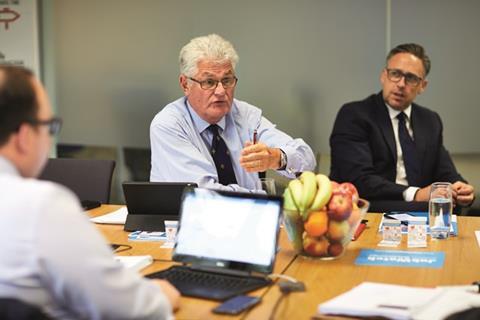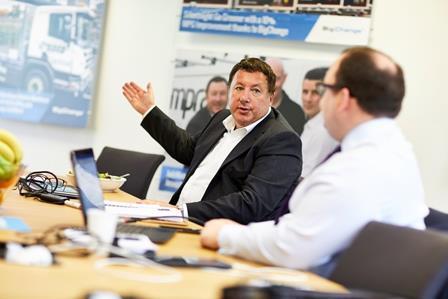
At the one-day internships of former MAN CEO Des Evans and the RHA’s Richard Burnett at fleet management software firm BigChange, Steve Hobson takes a closer look at the business.
At the Motor Transport Awards in July, Transaid held an auction of industry ‘superstar’ interns, sold off by awards co-host Gabby Logan for the highest bidder to have them working for a day in their company.
Martin Port, CEO of telematics and fleet management software firm BigChange, generously bid £12,000 for former MAN CEO Des Evans and RHA chief executive Richard Burnett. He had them hard at work at BigChange’s Leeds head office, reviewing the firm’s strategy in the road transport market.
Port is a larger than life character who built up and sold tracking and telematics business
Masternaut in the UK before founding BigChange in 2013. The company describes its cloud-based driver and vehicle management software as “the paperless way to plan, manage, schedule and track your mobile workforce”.
The system is so comprehensive it is hard to sum up what it does; even a thorough demo of its dozens of features only scratches the surface, as it aims to automate practically every function of a transport or field service operation. It also shares data seamlessly between its driver and vehicle management; job bookings; scheduling; customer management; and payroll and finance software, which avoids or drastically reduces paper trails and multiple entry of the same data into separate isolated software programmes.
Efficiency and maintenance
Used properly, the software can massively improve productivity and efficiency while reducing errors and delays in managing drivers; accidents; vehicles; work scheduling; parts inventories; health and safety; invoicing; and customer handling. Although not designed as a stock or warehouse management system (WMS), BigChange includes a parts inventory management function to help with vehicle maintenance, and for smaller operators this can also function as a WMS.
Vehicle tracking and telematics is included in all three levels of service, each simply priced per month per vehicle or driver. BigChange can also take a feed from most existing telematics systems already installed in the vehicle. While it schedules jobs – matching available work to assets and drivers in the most efficient order – it is not designed to replace a dedicated routeing and scheduling package.
The option of a ruggedised Samsung tablet for drivers is available, but it will also work on any Android smartphone. iPhone compatibility is coming soon in Q4 this year.

Port, pictured, said: “We have created something quitedisruptive with BigChange. It provides everything a transport operator needs.” BigChange already has 550 customers and 12,000 subscribers, and one plant hire operator has improved the productivity of its workforce by 20%. Another large bulk operator puts 20,000 jobs a month through the system, managing both its own and subcontractor vehicles and loads.
“BigChange enables operators to share jobs with subcontractors – everyone can see what
has been done electronically without the £20 cost of processing a paper transaction,” said Port. “It works for any size of business; transport and logistics is just one of many industry sectors we sell to.”
Evans, now honorary professor at Aston University Business School, saw massive potential for BigChange to transform the efficiency of traditional road freight operators, which often struggle to make more than marginal improvements in the efficiency of their operations. With competition fierce and margins low, Evans argues that only those operators able to make a step change in productivity will thrive in a future dominated by 'disruptor' firms such as Uber Freight and Amazon.
Productivity gains
“Today the average availability of a commercial vehicle is just 300 days a year,” he said. “With a 3% margin, that means most operators only make money on the last nine of those days, so vehicle uptime is the most important factor. Most fleets only use their vehicles for less than a quarter of each 24-hour period – even the best are only getting up to 40%. Doing more of the same but just a little bit better won’t do. Big productivity gains are what it has to be about.”
Evans said fundamentally operators need to know “the vehicle and driver are compliant and that the vehicle is working properly”.
Some operators had already asked BigChange to add a few extra fields such as driver licence checks to make the system fully FORS compliant, and one FORS inspector praised the levels of compliance it enabled an operator to achieve – and demonstrate.
The RHA’s Richard Burnett believes operators would benefit from integration of the outputs from all the in-cab devices now cluttering up modern trucks, including sat-nav, tachograph, telematics and phones.
“Operators just want a one-stop-shop for all the in-cab technology,” he said. “They also need to be able to see in real-time how many hours a driver has left.”
BigChange’s telematics module links to the digital tachograph status and the company is working on being able to remotely download driver files for analysis in accordance with O-licence conditions.
Burnett also saw that BigChange’s ability to share jobs electronically was ideal for today’s logistics operators that are heavily reliant on subcontractors. “The big 3PLs sub out up to half their work,” he said.
And the future...
Both Evans and Burnett were of the opinion that the DVSA’s earned recognition “will be the future”, and advised that BigChange must be able to deliver the necessary fleet management data in the right format.
“For earned recognition there will be five key criteria the DVSA will want to see in a standard format,” said Evans.
After a day discussing BigChange’s strategy for the logistics sector, Port pronounced it a “very valuable experience”.
“I have loved the day,” he said. “It is now all about what happens afterwards and there will be further meetings in future.”
BIG HITTERS IN TRANSPORT AND TELEMATICS
When it came to a day’s consultancy on how to improve his product and target the road transport sector, Martin Port could not have chosen two better interns.
Des Evans OBE retired from his job as CEO of MAN Truck and Bus UK in 2014 – the year he also won the Motor Transport Service to Industry award. He has more than 40 years’ experience in the industry, having worked at Ford and Mercedes-Benz before joining MAN.
He is now honorary professor at the Aston University Business School, working with Professor Tim Baines on the ‘servitisation’ of products ranging from trucks to tyres.
After a career spent in road transport with operators including Wincanton and Samworth Bros, Richard Burnett has been head of the RHA for three years, revitalising the trade association. He took the bold step of launching a class action against Europe’s major truck manufacturers, seeking compensation for over-pricing trucks, which has more than 2,000 operators signed up. He has significantly raised the profile of the association, reaching more than 408 million people through national and social media in the past 12 months, and has grown the RHA membership among own-account as well as hire and reward operators.
Port, on the other hand, started his working life at 15 in retail and then in bread and pretzels in New York. He returned to the UK in 1990 where he continued in the baking industry, until he got married and got into vehicle tracking with the ill-fated Minor Planet. He saw the potential of vehicle telematics, however, and founded Masternaut in the UK under licence from the French parent in 2002, building it into the UK’s largest B2B tracking business before selling it to Aéroports de Paris in 2009.
After a short break honouring a no-compete clause in the sale, Port began developing next-generation software that formed the basis of BigChange, which he launched in 2013. He expects BigChange to turn over £7m this year and has ambitious plans to grow the business.














